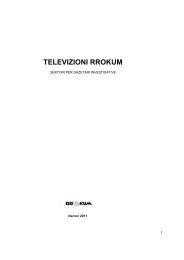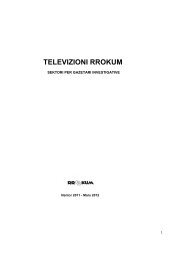Dossier KIJAC ENG - Rrokum TV
Dossier KIJAC ENG - Rrokum TV
Dossier KIJAC ENG - Rrokum TV
You also want an ePaper? Increase the reach of your titles
YUMPU automatically turns print PDFs into web optimized ePapers that Google loves.
Statement by the Cardiff School of Journalism, Media & Cultural Studies,<br />
Cardiff University, on its involvement in the Kosovo Institute of<br />
Journalism and Communications (Kijac)<br />
April 6 2011<br />
Between 2005 and 2010, Cardiff University allowed a small number of the<br />
academic staff from its School of Journalism, Media & Cultural Studies to teach<br />
some academic components of a course offered by the Kosovo Institute of<br />
Journalism and Communications (Kijac). The lecturers involved each spent one or<br />
two weeks a year teaching in Kosovo. This indicated the university’s commitment<br />
to the development of Kosovo, and to fostering a free and open media culture<br />
within the newest of Europe's states. Other parts of the Kijac course were taught<br />
by other institutions or by individuals with expertise in journalism skills.<br />
Cardiff University’s teaching met the highest standards – standards that make the<br />
Cardiff School of Journalism, Media & Cultural Studies one of the top three<br />
journalism studies institutions in the UK. We are proud of this contribution. Our<br />
contribution also included providing two PhD scholarships and one MA scholarship<br />
to three Kosovars whom Kijac wanted to develop as indigenous teaching staff on<br />
the project. Those Cardiff University staff who taught at Kijac part-financed these<br />
three scholarships out of the fees they were paid for their work in Kosovo.<br />
Cardiff University’s involvement in the Kijac project was limited. Cardiff’s role was<br />
confined to contributing specialised teaching on part of the course. Nebraska<br />
University in the United States made a similar, limited contribution. Cardiff<br />
University was willing publicly to acknowledge its input into the course to indicate<br />
the quality of instruction that Kijac students were receiving. But Cardiff University<br />
(like Nebraska) had no responsibility for the leadership, management,<br />
administration, funding and staffing of the project. Cardiff also did not have any<br />
responsibility for the accreditation of the course as an academic degree. Under<br />
the agreements that established Kijac, the Government of Kosovo and the project<br />
leader that exercised executive powers, the Gimlekollen School of Journalism and<br />
Communication, took on responsibility for the accreditation of the degree. As a<br />
matter of policy, Cardiff University does not accredit any degree unless, among<br />
other conditions, members of its own staff teach all aspects and components of a<br />
course of study leading to the award of that degree. This condition, among<br />
others, was not satisfied by the Kijac project.<br />
Questions about the issue of accreditation of a Kijac degree -- and about all<br />
matters relating to the staffing, leadership, administration, management and<br />
funding of Kijac -- should be directed to the Gimlekollen School of Journalism and<br />
Communication in Kristiansand, Norway, that led the project. The people best<br />
equipped to answer your questions at that institution are Mr Kaare Melhus, the<br />
Kijac project manager (kare.melhus@mediehogskolen.no), and Dr Lars Dahle,<br />
chairman of the board of Kijac (lars.dahle@mediehogskolen.no).<br />
signed:<br />
Professor Justin Lewis, Head of School, Cardiff School of Journalism, Media & Cultural<br />
Studies, Cardiff University.<br />
Dr Howard Barrell, Senior Lecturer, Cardiff School of Journalism, Media & Cultural<br />
Studies, Cardiff University.




